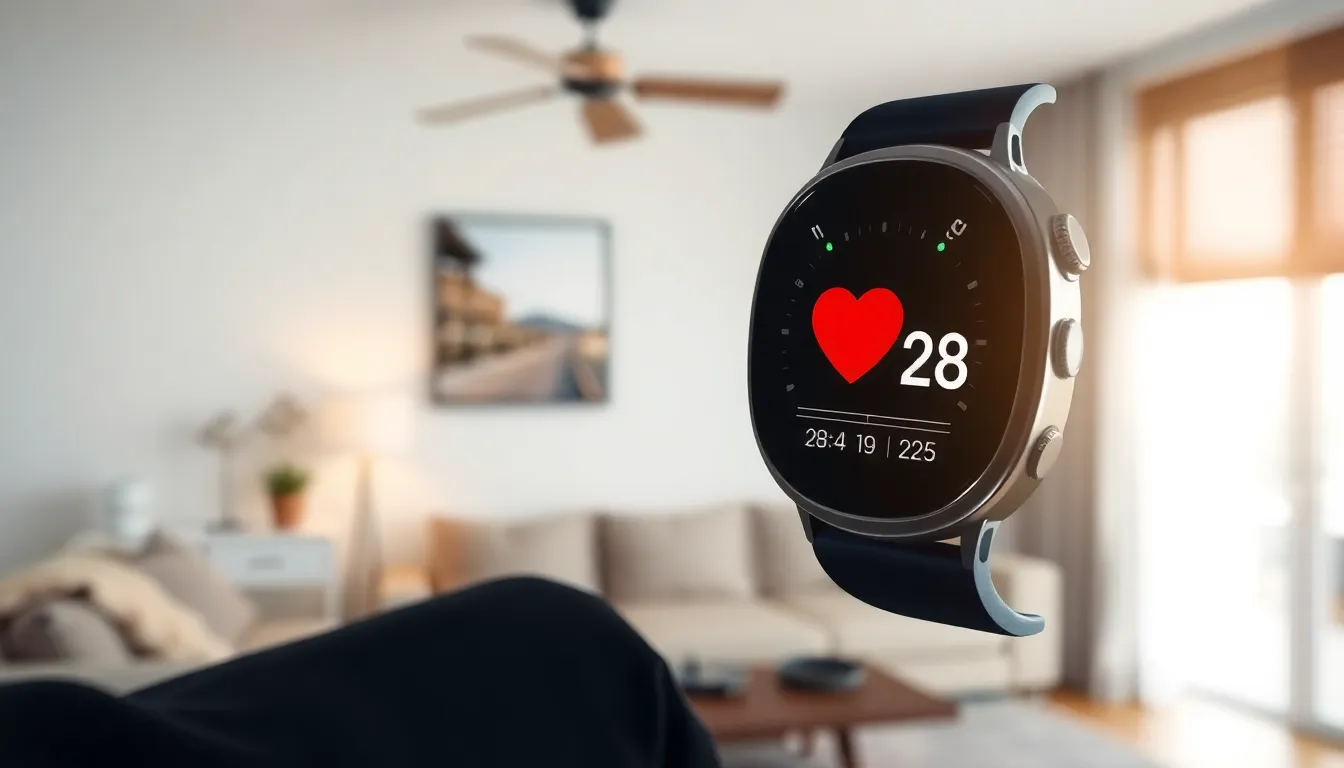In a world where your toaster can talk back, it’s no surprise that smart medical devices are taking center stage in healthcare. These high-tech gadgets don’t just monitor your health—they’re practically your personal health coaches, minus the sweat and motivational quotes. From smartwatches that remind you to breathe (seriously) to glucose monitors that sync with your phone, these devices are revolutionizing how we manage our well-being.
Smart Medical Devices
Smart medical devices represent a significant advancement in healthcare technology. They enable users to monitor their health in real time. These devices include wearables like smartwatches and health tracking apps. Each serves a specific function, such as tracking heart rate or monitoring blood sugar levels.
Data collected by these devices connects seamlessly with smartphones. This connectivity allows for easier access to health information. Users receive notifications for important health metrics. Immediate feedback contributes to better health decisions.
Smart glucose monitors exemplify the utility of smart medical devices. They transmit glucose levels to smartphones, allowing users to monitor changes throughout the day. With this information, individuals can manage their diabetes more effectively.
Similarly, smartwatches offer a variety of health features. They can track physical activity, sleep patterns, and even stress levels. In addition, some models prompt users to engage in breathing exercises, promoting mental well-being.
Healthcare providers also benefit from smart medical devices. These tools facilitate remote patient monitoring and can improve patient-provider communication. Regular updates on patient health data help providers to make informed decisions.
Smart medical devices play a crucial role in modern health management. They not only empower individuals through self-monitoring but also enhance the capabilities of healthcare professionals. The integration of these advanced technologies continues to shape the future of healthcare delivery.
Types Of Smart Medical Devices

Smart medical devices come in various forms, each offering unique benefits in health monitoring and management.
Wearable Devices
Wearable devices include smartwatches and fitness trackers. These gadgets monitor vital signs such as heart rate, sleep quality, and physical activity. Many users appreciate the convenience of tracking health metrics in real time. Data from these devices often syncs with smartphone applications, allowing for easy access and analysis. Notifications prompt users to stay active or monitor their health, fostering healthier habits. Market data indicates that the wearable health technology sector is projected to reach over $60 billion by 2025, reflecting their increasing popularity and utility.
Implantable Devices
Implantable devices are sophisticated tools designed for chronic disease management. Examples include pacemakers and continuous glucose monitors that reside internally. These devices continuously collect and transmit health data, ensuring real-time monitoring of critical conditions. Wired for connectivity, implantable devices provide healthcare professionals with invaluable insights for personalized treatment plans. Research shows that these advanced devices significantly enhance patient outcomes by facilitating proactive interventions through ongoing data transmission.
Smart Monitoring Systems
Smart monitoring systems integrate various technologies to track patient health remotely. Solutions such as telehealth platforms and connected health hubs streamline communication between patients and providers. These systems often combine data from multiple devices, offering comprehensive health analytics. Users benefit from immediate notifications regarding health metrics, prompting timely interventions. Statistically, remote patient monitoring has demonstrated a reduction in hospital readmissions by up to 30%, illustrating its effectiveness in improving health management.
Benefits Of Smart Medical Devices
Smart medical devices offer numerous advantages that enhance healthcare delivery. They provide valuable tools for individuals and healthcare providers alike.
Improved Patient Outcomes
Smart medical devices directly impact patient health by allowing for personalized treatment options. Continuous health monitoring leads to timely interventions that prevent complications. For example, individualized data from smart glucose monitors enables precise insulin delivery for diabetes management. Enhanced tracking of vital signs contributes to improving chronic disease outcomes. Patients benefit from immediate feedback, fostering better health decisions and adherence to treatment plans.
Enhanced Data Collection
Accurate data collection is crucial for effective healthcare. Smart medical devices capture real-time health metrics, including heart rate and activity levels. This information assists healthcare providers in making informed decisions. Consistently available data supports ongoing evaluations of treatment effectiveness. Healthcare systems experience improved accuracy in patient records, leading to a more tailored care approach. Access to comprehensive data helps identify trends and predict potential health issues.
Remote Patient Monitoring
Remote patient monitoring transforms the way healthcare is delivered. Patients use smart medical devices to share health information with providers from home. Convenient access reduces the need for frequent in-person visits. Improved communication between patients and healthcare teams enhances engagement in health management. Telehealth platforms integrate seamlessly with smart devices, offering continuous support. This practice significantly decreases hospital readmission rates, ultimately improving patient satisfaction and outcomes.
Challenges And Considerations
Smart medical devices face several notable challenges that can impact their effectiveness and adoption.
Data Security And Privacy
Data security concerns loom large. Sensitive health information collected by smart devices needs strong protection against breaches. Regulations like HIPAA set standards, but compliance varies. Personal health data must remain confidential, creating trust issues among users. So, manufacturers must implement robust encryption methods and secure cloud storage to safeguard data from unauthorized access. Users desire control over their information, leading to the need for clear privacy policies. Transparency regarding data usage builds user confidence and fosters widespread adoption.
Regulatory Hurdles
Regulatory hurdles complicate the landscape for smart medical devices. The FDA oversees many of these devices, classifying them based on risk levels. Approval processes can be lengthy and costly, causing delays in innovation. Manufacturers often face challenges in meeting rigorous testing standards, which can slow development timelines. Streamlining regulatory pathways has become crucial for fostering innovation while ensuring safety. Successful navigation of these hurdles ultimately leads to increased market access and user adoption.
User Adoption
User adoption presents another significant challenge. Although smart medical devices offer valuable health insights, users often hesitate to integrate them into daily routines. Factors such as usability and perceived value influence adoption rates. A seamless user experience, combined with education on benefits, encourages individuals to embrace smart devices. Additionally, integration with existing health systems is vital. Many users seek solutions that enhance their healthcare journey without overwhelming them with complexity. Engaging communication from healthcare providers also plays a pivotal role in encouraging regular use and acceptance.
Future Trends In Smart Medical Devices
Artificial intelligence integration represents a major trend shaping smart medical devices. This technology enables devices to analyze health data more effectively. Predictive analytics can identify potential health issues before they manifest, leading to proactive healthcare management.
Telehealth capabilities continue to expand, enhancing the utility of smart medical devices. Patients now rely on connected devices to facilitate virtual consultations with healthcare providers. This trend reflects a growing acceptance of remote health management among patients, showcasing a shift towards convenience and efficiency in healthcare delivery.
In addition, an emphasis on personalized medicine drives innovations in smart medical devices. Devices increasingly adapt to individual user preferences and health conditions, tailoring features to optimize user experience. Wearable technology evolves to offer real-time feedback tailored to specific health requirements, such as heart rate variability or stress levels.
Cybersecurity improvements are essential for protecting sensitive health data. Manufacturers increasingly prioritize robust encryption to secure user information from breaches. Regulations surrounding data protection are also expected to tighten, ensuring that both companies and consumers uphold privacy standards.
Lastly, greater interoperability among devices will significantly impact user experience. Compatibility across different platforms allows seamless data sharing that maximizes the utility of connected healthcare systems. Smart medical devices increasingly align with established electronic health record systems, facilitating better tracking and management of patient health data.
Innovative designs are expected to enhance user engagement as aesthetics and functionality merge. Sleek, user-friendly designs encourage regular use and integration into daily routines. As smart medical devices continue to advance, they are set to revolutionize healthcare delivery and patient management.
Conclusion
Smart medical devices are reshaping the landscape of healthcare by empowering individuals and enhancing patient outcomes. With their ability to provide real-time health data and personalized insights, these devices are not just tools but essential partners in health management. As technology continues to evolve, the integration of artificial intelligence and improved cybersecurity measures will further enhance their effectiveness and user trust.
The future of healthcare looks promising with smart medical devices at the forefront. They not only facilitate better communication between patients and providers but also pave the way for more personalized treatment plans. As challenges are addressed and adoption grows, these innovations will undoubtedly play a crucial role in transforming healthcare delivery for years to come.


